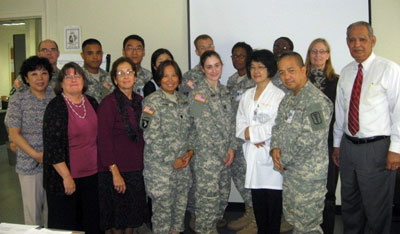Public Affairs
Force Health Protection Division provides annual training in Korea at U.S. Army Garrison's 121st Combat Support Hospital/Brian Allgood Army Community Hospital

Group photo of the annual training at Yongsan U.S. Army Garrison's 121st Combat Support Hospital Brian Allgood Army Community Hospital in Seoul, Korea during the week of Sept. 12th.
The Force Health Protection-Investigative New Drugs Division of U.S. Army Medical Materiel Development Activity worked with the Yongsan U.S. Army Garrison's 121st Combat Support Hospital/Brian Allgood Army Community Hospital in Seoul, Korea during the week of Sept. 12th to train providers and medical staff on the Force Health Protection contingency protocols, documentation requirements, inventory management procedures, and refresher training on Good Clinical Practices.
Lt. Col. Travis Watson, director of FHP, met with the 65th Medical Brigade Force Health Protection Branch Chief to better understand the medical and force health capabilities on the Korean Peninsula and how each group could better integrate their capabilities. "The purpose of the visit was to understand medical response plans, evaluate cold storage capabilities, warehouse operations, and improve distribution capabilities for FHP contingency products," said Watson. Acquisition, storage, and testing of IND products are a part of FHP Division's core capabilities. These capabilities are shared globally with partners, such as in Korea. The training FHP provides to their partners abroad, keeps consistency in work while thousands of miles may separate them, keeping everyone on the same track. According to Marianne Erlichman, FHP product manager, personal interaction with their partners is a direct benefit to the mission, especially when there is a turnover in staff. "We always find that after having a face-to-face meeting with our new principal investigators, sub-investigators, medical monitors, pharmacy professionals and other hospital staff it makes our communications much easier," said Erlichman. "Suddenly we are not just a person sending them an email from Fort Detrick, but someone they have spent time with and they know we care about them." Post-training surveys were given to participants evaluating the training. Feedback from the surveys proved the training to be informative and helpful in accomplishing their responsibilities related to the protocols. According to Watson plans are currently being worked on to conduct a force health protection track at the 38th Parallel Medical Conference in 2012.
Last Modified Date: 01/14/2025













